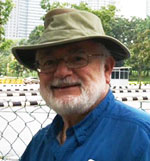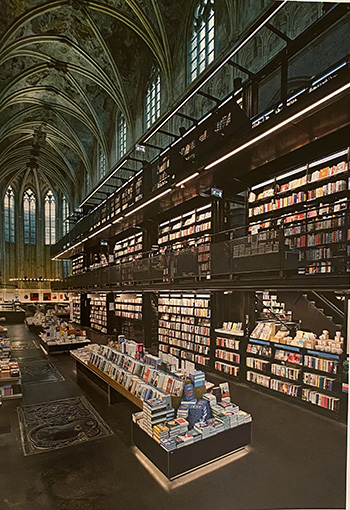Bookstores, A Celebration of Independent Booksellers compiled by Horst A. Friedrichs and Stuart Husband (Prestal Verlag; Munich, London, New York, 2020) Printed in Slovakia.
By Oliver B. Pollak, Ph.D


RICHMOND, California — This coffee table book weighing 3¾ pounds offers 312 stellar photographs of 50 bookstores in eight countries by Frankfort born, Munich educated, and London based Horst A. Friedrichs.
The select 50 start in the 19th century in Paris with 240 open air “bouquinistes”, peddler stalls along the Seine river. Across the Channel in London is the magisterial Maggs Ltd. Rare Books and Manuscripts established in 1853. The most recent opened in the late 20-teens.
The foreword is by German born Nora Krug author of the prize-winning graphic novel Belonging: A German Reckons With History and Home (2018). Born in Karlsruhe in 1977 she married into a Jewish family and started researching her families World War II history.
Online sources reveal some Jewish bookstore connections. New York’s fabled multistory Strand dates from 1927 when the current owner’s grandfather, a Lithuanian, opened a small bookstore. Nancy Bass Wyden presides over 2.5 million new, used and rare books, and incalculable personal bookstore experiences. Nancy is married to Ron Wyden Oregon’s Jewish U.S. Senator. His parents fled Nazi Germany. We visited the Strand’s top floor rare book room. My wife’s “fingerspitzengefühl,” German for a special instinct, found a late 1890s children’s adventure story about Burma, On the Irrawaddy by George A. Henty. The Strand sends me at least one promotional email a week.
Lawrence Ferlinghetti, co-founder of San Francisco’s City Lights Booksellers, opened in 1953. His grandmother was of Sephardic descent. Emma Straub who opened Books are Magic in Brooklyn in 2017, according to the online Jewish Chronicle, is the daughter of an atheist Jewish mother. The Jewish parents of the owner of Persephone Books in London left Germany in the 1933. Felicity Rubenstein of Lutyens books in London is the daughter of Jewish parents.
Seventeen of the bookstores were in Germany and Austria. Jewish bookseller roots on the continent are much thinner, but there is a trace. Felix Jud in Hamburg, despite his last name was not Jewish. He supported the White Rose resistance to the Nazi regime and survived his imprisonment in Neuengamme concentration camp. At Anna Jeller Buchhandlung in Vienna hangs the Hannah Arendt admonition, “Keiner hat das Recht zu gehorchen,” ‘nobody has the right to obey,’ question authority. Arendt wrote the Origins of Totalitarianism (1951) and Eichmann in Jerusalem: A Report on the Banality of Evil (1963). These bookstores combat the aberration of German book burning.
Three bookstores concentrated on architecture, three on photography, one emphasized relieur-French book bindings. The buildings may be much old than the bookstores. For instance the image on the cover of the book, the mid-13th century Gothic Dominican church, contemporary with Notre Dame, opened as a bookstore in 2006. The Bücherbogen in Berlin opened under railroad tracks in 1980 has brick arched barrel ceilings. Livraria Lello in Porto, Portugal is a magic playland enhanced by the fact that J. K. Rowling of Harry Potter fame frequented it when she taught English in Porto. These bookstores are tourist attractions, some may be vying for United Nations World Heritage Site status.
The store interiors are filled with artfully crafted shelves with color blaring spines, two vintage Remington manual typewriters, laptop computers, weathered rolling book trucks and three step wood bookcase ladders, colorful twelve step wood and metal rung ladders reaching to the ceiling. Some booksellers see themselves as saviors of print culture. There is also the phenomena of reverse shoplifting. Visitors surreptitiously placing their personal giveaways on the shelf.
Twenty-seven of the 50 book emporiums appeared since 1990, twenty-two in the 21st century. There are conflicting reports on reading books on paper and on line. Brick and mortar book chain sales decline while online book sales rise. This book reveals the vitality of entrepreneurs willing to risk and enter the indie book scene. For instance Gay’s The Word, England’s first LGBTQI bookstore started in 1979. Seventeen-year-old Mrs. Dalloway’s Berkeley bookstore went up for sale in April and was purchased by a younger couple a few days ago.
Distance, time, mobility and expense interfere with visiting these establishments. This glossy, heavily illustrated, book is the readers passport to where they otherwise might not go.
*
Oliver B. Pollak, Ph.D, a professor emeritus of history at the University of Nebraska Omaha, and a lawyer, is a correspondent now based in Richmond, California.